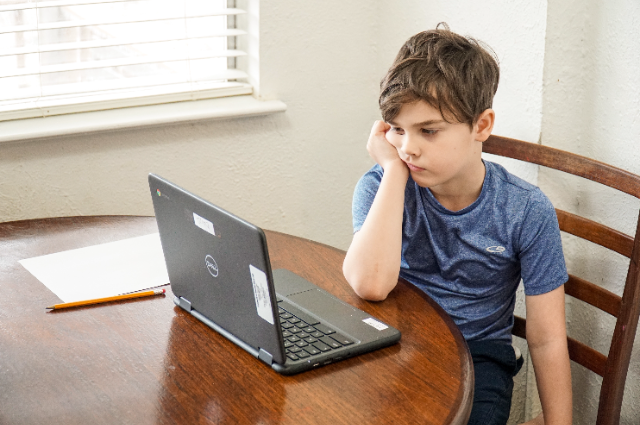
Photo by Thomas Park on Unsplash
Ever since the COVID-19 pandemic broke out from Wuhan, China in the latter half of 2019, the world has witnessed an unprecedented number of deaths and hospitalization. This led most of the governments across the world to impose strict lockdowns extending to many weeks to contain the spread of the pandemic. This current pandemic has taken a toll on the almost all the fronts of human civilization, let it be media, social, economic, commercial, academic or political. Persons affected with COVID-19 had to undergo prolonged duration of quarantine either at hospitals or at home. This forced isolation led to a sudden increase in the number of people, both adults and children, who were mentally and emotionally affected. The student community across the world had to miss their regular schools and colleges due to the lockdowns and the strictly imposed travel restrictions. This unique and unfortunate situation has led to the use of e-platforms for continuing education which was difficult in the beginning. All those involved in this process had to overcome a lot of resistance to accept this new medium of e-education. This led to a change in the perception of education by students, teachers and even parents too. The way teachers teach and students perceive the lessons has taken a completely new turn and has led to psychological changes among the student community. The psychological effects of the COVID-19 pandemic and the associated restrictions on the mental health of students need to be documented due to its long-term impact. Due to the growing concerns about the Mental Health Status being affected by the COVID-19 Pandemic, there is an urgent need to address these concerns with scientific data. Being isolated from friends, especially in school and college has led to a profound impact on the well-being of the students. It has led to learning the ‘e way’ which has its own pros & cons.
Hence, this article aimed to decode and understand the effects of COVID-19 pandemic on the psychosocial aspects of students, which in turn, has an impact on the academics. A plethora of research has helped us understand the gravity of mental health issues prevailing in academia. Mental health refers to cognitive, behavioural, and emotional well-being. Conditions such as stress, depression, and anxiety can affect mental health to a greater extent & thus affect a student’s daily routine by causing a deleterious effect on their motivation, concentration, and social interactions. Mental health issues can significantly impair students’ academic success and social interactions thus affecting their career and personal opportunities.
Javed et al in their study also concur with the results obtained in our research that dealing with the mental challenges thrown up by this pandemic needs to be taken up seriously and destressing can be done by spending time with family members, indulging in different healthy exercises, sports and taking a break from the traditional social media.
The COVID-19 Pandemic has caused profound implications on health and economic progress disrupting the demand & supply chain across the world and placing everyone in an unprecedented situation thus affecting all walks of life. Education is among those aspects which have been hit to a greater extent thus affecting the mental health of the students. There has been a paradigm shift from traditional classroom teaching to online teaching methods due to the pandemic which has further exacerbated academic stressors for students. The prevalence of the pandemic has accentuated fear among students constraining their physical activities. Fear of contacting COVID-19 infection, boredom, inadequate supplies & financial loss are some of the stress-causing factors which are impediments to their mental health.
In our study, only one-third of the participants found online teaching useful. This has been substantiated by other studies wherein the result has shown that online teaching is not favored. This low acceptance may be because of other co-factors like boredom, lack of active participation of motivation, and missing friends. They felt that online learning could not replace clinical teaching and practical skills could be learnt properly only in offline mode. Many found difficulty in concentrating during online lectures and had difficulties in recalling previous lectures.
In dentistry, clinical expertise comes from rigorous practice. But as coronavirus spreads through aerosols, clinical procedures were postponed unless it was an emergency wherein with due protection, the procedures could be done. Rest of the procedures were postponed. This led to students losing time to learn clinical skills. This was one of the reasons more than 40% of the students were unable to communicate with the patients properly. They were not confident of their skills due to a substantial decrease in the practical experience.
A multitude of compassionate academic activities which were carried out by the students before the pandemic are not being accomplished by them due to the consequences of the pandemic. A series of adverse effects which have a deteriorating influence on the mental health of the students include a high degree of irritability, mood swings, anxiety, low mood, inclined towards emotional eating, difficulty recalling, and disturbed sleep.
Lack of communication with the patient has been stressful to the students which reduces their confidence to work with patients. The Pandemic has not only caused issues academically but has created a huge negative impact on the students’ social life thereby affecting the relationship with their loved ones or family members. Some students might also lose appetite thus increasing their chances of gaining weight due to improper diet control or over-eating which is common during the pandemic. This further affects their standard of living & causes hindrance to their mental health status.
Conclusion
Ensuring adequate infection control measures to ensure a safe working environment & periodic counseling can help students cope up with the negative impact of covid 19 on mental health. Support systems from the grassroots level to the national level are the key to fighting the impact of the COVID-19 pandemic on the mental health of the students.
